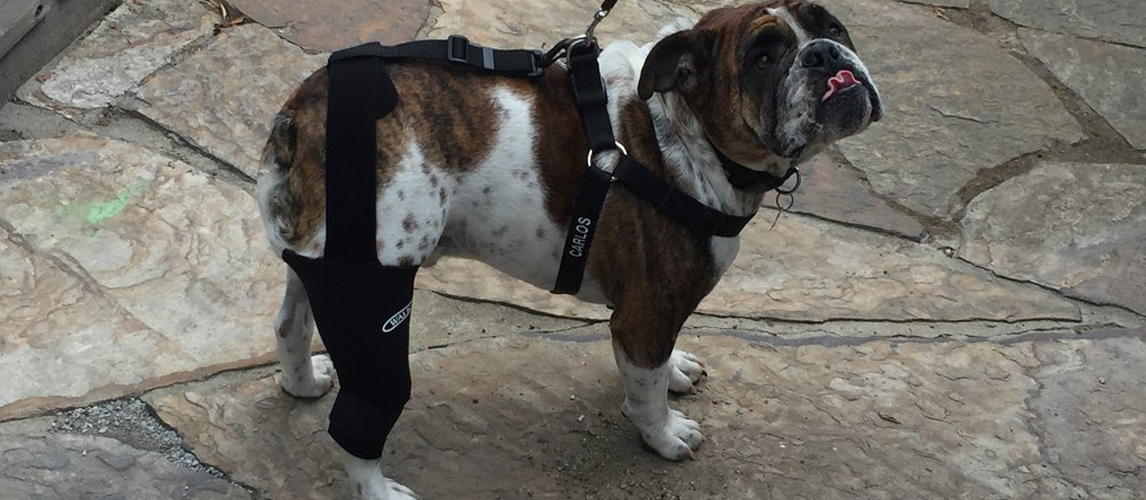As a pet owner, you never want to see your dog in pain, so if your dog has an injury you want to get them treated as quickly as possible. If you notice that your pet is struggling to walk, they could have suffered from a cruciate ligament injury, which is a surprisingly common occurrence in many breeds of dog.

Cruciate ligament injuries are one of the more serious medical problems that your dog can have, and unfortunately, certain breeds have a predisposition to developing the condition.
Although vets don’t actually know why these injuries occur so frequently, they do know it occurs when there is a tear or rupture in the joint of the knee, which may either happen during a sudden movement, such as a fast turn, or slowly over time due to degeneration in the ligament. When this happens, surgery is the only solution.
What Are The Symptoms Of A Torn Cruciate Ligament?
There are several symptoms which you may see in your dog if they have suffered from a torn cruciate ligament. These include:
- Limping
- Difficulty in standing
- Sitting to one side
- Difficulty in sitting
- Walking with three legs
If you notice that your dog is experiencing any of these symptoms, it is important to take them to the vet for a professional opinion as soon as possible as, although the problem may not be serious, it could be a torn cruciate ligament which requires surgery.
Which Dogs Are More Likely To Suffer From A Torn Cruciate Ligament?
While it is not yet known the precise cause of cruciate ligament injuries, it is believed that genetics are the primary cause of torn cruciate ligaments, although it’s possible that neutering or spaying at too young an age could be another contributing factor.
Dogs who already suffer from knee problems such as patellar luxation or who have had previous trauma in that area will also have an increased chance of having a torn cruciate ligament. There are also some breeds that are especially prone to this condition, and these include the following:
- Akita
- Newfoundland
- Labrador Retriever
- Chesapeake Bay Retriever
- Rottweiler
- Neapolitan Mastiff
- Staffordshire Bull Terrier
- Saint Bernard
Although it is usually older dogs that are most likely to suffer from torn cruciate ligaments, younger animals may also suffer, so if you spot any of the above symptoms in your pet you should always take them to the vet since it could be this serious condition.

What Is The Treatment For A Torn Cruciate Ligament?
Typically, a torn cruciate ligament will be treated by surgery and medication followed by long term rehab with physical therapy. There are several surgical techniques which can be used to correct this condition including:
- TPLO And TTO – Tibial Plateau Leveling Osteotomy and Tibia Osteotomy are believed to be the best approaches to surgically manage torn cruciate ligaments in dogs weighing over 25lbs. These surgeries keep the knee stabilized, allowing the dog to weight-bear on the knee joint. A metal plate would be inserted to help with balance and the dog would generally return to full normal activities in around 6 weeks.
- Extra-Capsular Repair – This is a very common procedure however it is best used in dogs that weigh less than 25lbs. This form of surgery uses sutures or artificial bands to stabilize the knee.
- Tightrope – Similar to the Extra-Capsular repair, this surgery may not be as successful for large breed dogs.
The Cost Of Torn Cruciate Ligament Surgery
The amount you can expect to pay for torn cruciate ligament surgery in dogs will depend very much on where you live, which vet you use, the breed of your pet and have severe the damage is to the knee joint. Even if your dog is insured, it is unlikely that your insurer will pay the full cost of the treatment. The minimum price of this kind of surgery is around $1200, but could be as high as $8000.
Costs After Surgery
Unfortunately, it is not only the cost of surgery that needs to be taken into account if a dog suffers from a torn cruciate ligament. There are also ongoing costs to bear in mind. Pain relief may be required for life, and vets often recommend that fatty acid and glucosamine supplements are given too. Some dogs are also prescribed human opiate medications as well as anti-inflammatories too.
There is also some rehabilitation required to recovery fully from this condition. Muscle gain and weight loss are key to the success of the surgery, however the physical therapy is often covered by pet insurance companies. Unfortunately, there is often a waiting time before dogs can be given this kind of surgery.
Take a look at our Dog Knee Braces Review.
Is There Any Way To Prevent A Torn Cruciate Ligament?
It is very difficult to prevent your dog from suffering from a torn cruciate ligament since it generally occurs due to activity, and it would be very unwise to stop your dog from exercising and running since this puts your pet at many other health risks.
It has been suggested that dogs are only neutered or spayed after they are two years old to try to limit the risks, although some vets are against this due to the risks of unwanted litters of puppies. Breeders also have a role to play in stopping breeding dogs whose puppies experience torn cruciate ligaments repeatedly.
The best thing that any dog owner can do is to keep their pet as healthy as they can be, helping them to maintain the right body weight for their breed and ensuring that they get plenty of exercise to keep in shape.
However, even these tips are not a guarantee that your dog will not suffer from a torn cruciate ligament and therefore it’s essential to always get adequate pet insurance for your dog which will cover the majority of the cost of torn cruciate ligament surgery as well as the cost of rehabilitation and prescription medications following the surgery in a worst-case scenario.
Sources:
Note: The advice provided in this post is intended for informational purposes and does not constitute medical advice regarding pets. For an accurate diagnosis of your pet's condition, please make an appointment with your vet.





